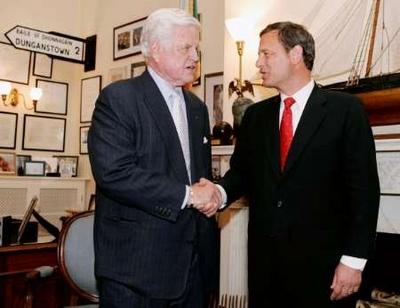Chavez and Jackson: Speech Suppressors
 The international community is in an uproar over a few meandering comments made by 700 Club host and footnote former Presidential candidate Pat Robertson last week. Robertson suggested that if Venezuelan President Hugo Chavez “thinks we're trying to assassinate him, I think we really ought to go ahead and do it. It's a whole lot cheaper than starting a war. … We have the ability to take him out and I think the time has come that we exercise that ability.” (Click here for audio.)
The international community is in an uproar over a few meandering comments made by 700 Club host and footnote former Presidential candidate Pat Robertson last week. Robertson suggested that if Venezuelan President Hugo Chavez “thinks we're trying to assassinate him, I think we really ought to go ahead and do it. It's a whole lot cheaper than starting a war. … We have the ability to take him out and I think the time has come that we exercise that ability.” (Click here for audio.)In response, an angry Chavez said Sunday that his government will ask the United States to extradite Robertson to Venezuela to prosecute him for his words. (The United States response was that such an extradition request appears to be baseless.) Likewise, while meeting in person with Chavez, Rev. Jesse Jackson supported the spirit of Chavez’s retort and called Robertson’s words “illegal.”
Jesse Jackson has aligned himself with a leader hostile to the United States and individual rights. He is seemingly oblivious to a constitutional right that has protected his civil rights-related speech over the decades of his public advocacy. And yes, Mr. Jackson, there is a difference between a foreign policy discussion and Janet Jackson's exposed breast vis-à-vis a “wardrobe malfunction” (although Mr. Jackson apparently believes that Robertson is a boob, he errs by claiming that the Super Bowl and 700 Club snafus should be treated the same way).
The United States has attempted to assassinate political leaders of other countries several times in the past. Indeed, the CIA attempted to kill Cuban dictator Fidel Castro eight different times between 1960 and 1965. However, since 1976 it has been against U.S. policy for government agents to assassinate foreign leaders.
Whatever one may think of Robertson’s statement, which he later cowardly denied he said and then apologized for, defenders of freedom must stand by Robertson’s right to say such words and condemn any suggestion by Chavez or Jackson that Robertson ought to be held criminally liable for his statements.
In Brandenburg v. Ohio (1969), the United States Supreme Court overturned the conviction of a Klansman engaging in some edgy speech suggesting harmful retaliation. The unanimous per curiam opinion stated: “The constitutional guarantees of free speech and free press do not permit a state to forbid or proscribe advocacy of the use of force or of law violation except where such advocacy is directed to inciting or producing imminent lawless action and is likely to incite or produce such action.” Robertson did not ask for imminent lawless action while standing in the same room as Chavez. He merely suggested that, rather than engage in a war against Venezuela, the United States take a particular course of action, however inadvisable that action would be.
It is frightening to even consider the prospect of an American citizen being extradited to a country where freedom is scarce to face charges for speech that we take for granted every day. Although located on the outer ring of protected free speech, Robertson’s words are the ramblings of a talk show host about his foreign policy theory and do not constitute a serious death threat. The Brandenburg Court wrote that “the mere abstract teaching . . . of the moral propriety or even moral necessity for a resort to force and violence, is not the same as preparing a group for violent action and steeling it to such action.”
Even a threat against the President of the United States must be a “true threat.” In United States v. Watts (1969), the Supreme Court reversed a conviction based on a Vietnam War protestor’s statement that if he were drafted and forced to carry a rifle “the first man I want to get in my sights is L.B.J.”
Why is so much press attention being focused on Robertson and Jackson-- who have never been elected or appointed to any major political position --and why are their views seen as significant U.S. foreign policy expressions? We are once again being disserved by the cult of celebrity. There are other individuals far more qualified to speak on foreign policy concerns. The media should "take Robertson and Jackson out" of the spotlight.









